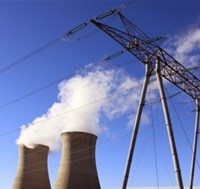Nuclear energy has always been the proverbial bogeyman when it comes to power supply. Mention the subject and Three Mile Island, Chernobyl and Fukushima are immediately thrown into the mix as worst case scenarios.
So it's not surprising that the Minister of Energy's announcement that the country would be commencing with its nuclear procurement process in the second quarter of the financial year - during her policy and budget speech in Parliament on 19 May, 2015 - has reignited the debate.
Besides the environmental risk, there is much scepticism about Minister Tina Joemat-Pettersson statement: "... to select a strategic partner or partners in a competitive, fair, transparent and cost-effective manner...", given the government's less-than-exemplary history in procurement processes, most notably the infamous Arms Deal.
On 22 May, 2015, the Catholic Parliamentary Liaison Office (CPLO) hosted a roundtable discussion on "Implications of a South African Nuclear Build", where various interest groups voiced their opinions.
In the nuclear corner
Answering the question of why nuclear power makes sense for South Africa, Shane Pereira, business development manager, Lesedi Nuclear Services said: "The country is in dire need of base-load power and South Africa's uranium reserves are ranked at number seven in the world, making nuclear a viable option."
Base-load power comes from sources that can consistently supply power to satisfy the minimal level of demand. In South Africa, the primary source of base-load electricity is from coal-fired power stations due to the country's abundance of this natural resource.
Currently Koeberg is the only nuclear power station in the country and supplies 18,000MW to the national grid. The plan is to have six more nuclear power stations in South Africa at a cost of R400bn to R1tn by 2030. The new facilities are expected to add an additional 9,600MW to the grid.
Independent energy consultant, Andrew Kenny, is adamant that nuclear power is the way to go in South Africa. He says that renewable energy sources such as wind and solar power work well for households wanting to move off the grid, but have proven ineffectual in large-scale energy production. He uses Germany as an example, saying that Germany made the move to wind power, resulting in the highest electricity costs in Europe and the government is now reconsidering its options. "Nuclear power is the safest form of energy, it's clean, reliable and sustainable," Kenny explained.
He used another example to illustrate his point. The devastating earthquake and tsunami in Japan killed over 16,000 people in March 2011 and severely damaged four units at Fukushima-Daiichi nuclear station. "Fukushima gave a spectacular demonstration of nuclear safety, because nobody (0 people) was killed or harmed by the radiation and nobody is likely to be in future," maintained Kenny. He added that there had only been one nuclear accident in the full energy chain from 1969 till 2000 (where five people had been killed) compared with 1,119 accidents from coal.
On the green side
Liz McDaid, energy advisor for the Southern African Faith Communities' Environment Institute (SAFCEI) countered the argument on nuclear safety in the South African context by saying: "The International Atomic Energy Agency found South Africa's nuclear preparedness deficient in more than 40% of its assessment criteria."
She said that in terms of civilian exposure, there had been lots of little accidents for which social justice delivery was slow. She cited the claim by workers from Pelindaba nuclear works that they had contracted diseases as a result of radiation exposure in the 1980s and 1990s. "In 2004, there was still no resolution to these claims," she said.
She added that the framework agreement signed by the minister in September last year with Russia as a possible vendor to build nuclear stations in South Africa indemnifies the Russians from claims in the event of any radiation accidents. Furthermore the secrecy surrounding the agreement when it was signed raises further concerns around the transparency of any deal in the future.
Saliem Fakir, head, Living Planet Unit, World Wildlife Fund, said that the energy plans - whether nuclear or coal powered - were all long-term when South Africa faced a power crisis now. This is where renewable energy does play a role as they require short lead times to become operational.
There was no consensus on what the implications of a South African nuclear build would be from the roundtable discussion, but it did clearly outline worries about the transparency of any deal that the government brokers, and the pros and cons of the various forms of energy.






































